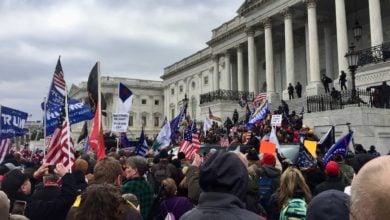In the days following a July 23 UNITE HERE hospitality workers’ union-initiated press conference announcing the launch of a global boycott of the Hyatt hotel chain, pickets and rallies were held at numerous Hyatts around the United States. The Grand Hyatt in San Francisco and Hyatt Regency Santa Clara saw demonstrations July 26 and July 28 that drew more than 300 and 250 participants, respectively.
According to UNITE HERE Local 2 spokesperson Julia Wong, the boycott will end when the Hyatt agrees to three demands. Two of these are a “fair and mutual process for non-union workers to organize” and “a fair contract for thousands of unionized Hyatt workers [who] have been without a contract for three years.” Most important, Wong said, is to implement the workplace safety measures that the Occupational Safety and Health Administration recently outlined in a letter to the Hyatt corporation and its CEO, Thomas J. Pritzker. (San Francisco Bay Guardian, July 27)
The majority of Hyatt’s workforce, which is predominantly immigrants and women, remain non-unionized. The differences between the working conditions of unionized and non-unionized hotel workers nationally are striking. Housekeepers in the latter category are often required to make almost twice as many beds per shift as their unionized counterparts.
Hotel workers, organized or not, have some of the most physically punishing jobs in the United States, and Hyatt has singled itself out as the worst abuser of all the major hotel chains. There are more reported cases of injuries to workers at Hyatt than any other chain, as the workers, particularly the non-unionized majority, are forced to fulfill punishing room-cleaning quotas to retain their jobs.
Other major hotel chains, such as Intercontinental and Hilton, signed union contracts in 2011 that allowed for card check, or majority sign-up. This procedure, provided for under current labor law, enables workers at affiliated hotels not yet unionized to win union recognition without the delays and company intimidation that invariably accompany the so-called “secret ballot” procedure. Hyatt, however, continues to demand that majority sign-up be removed from contracts under negotiation.
Unite Here Local 2, based in San Francisco, has indicated a willingness to sign contracts that do not include majority sign-up if the contract includes a solidarity clause allowing unionized Hyatt workers to picket, strike or call for boycott in the name of non-unionized Hyatt employees. But Hyatt continues to refuse to compromise.
As part of the effort to achieve justice and fair treatment for Hyatt workers, the Hyatt Hurts Coalition was founded, which in addition to UNITE-HERE includes the AFL-CIO, the NFL Players Association, the National Organization for Women, the National Gay and Lesbian Task Force, Interfaith Worker Justice and many other entities. Local union-community coalitions exist in many cities in support of Hyatt workers.
One such coalition, based in San José and the surrounding area, has been actively supporting the Hyatt workers in Santa Clara for the past four years. It went all out to mobilize supporters to join the “fourth anniversary” picket and rally July 28, using Facebook and other social media as well as e-mail blasts, flyers and word-of-mouth.
During the rally, eight members of the workers’ committee at the hotel were introduced. Maria Lopez, a young worker and part-time student, gave a moving description of how she had been mistreated, required by her Hyatt bosses to lift heavy urns of coffee and push heavily loaded food carts while pregnant with her first child.
The spirits of those picketing the hotel was kept high with the lively sounds of the Brass Liberation Orchestra, which came down from San Francisco to lend its support.
During the wind-up rally, Lindsey Leong, a young South Bay activist and community leader, performed spoken word, and UNITE HERE Local 19 organizer Sarah Julian urged everyone to get online and “Vote Hyatt Worst.”
Both Bay Area actions ended with chants of “We’ll be back! We’ll be back!”
William West contributed to this article.






